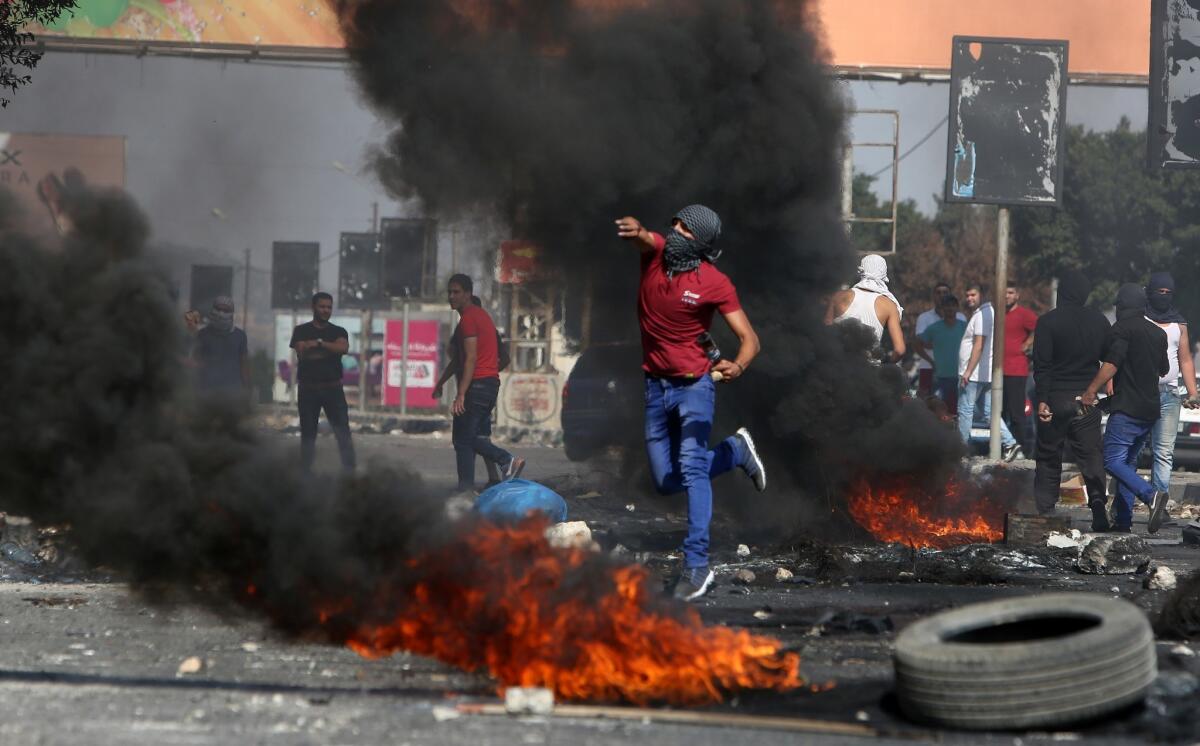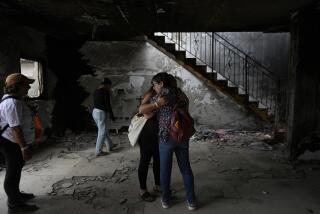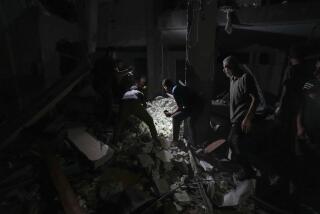Abbas denounces Palestinian firebombing of Joseph’s tomb in West Bank

A Palestinian demonstrator hurls a rock at Israeli border guards during a clash Friday at the Hawara checkpoint south of the West Bank city of Nablus.
- Share via
Reporting from Jerusalem — Palestinians set fire to a West Bank shrine holy to Jews, drawing sharp condemnation Friday not only from Israel but from Palestinian Authority President Mahmoud Abbas, who has been heavily criticized for failing to denounce a recent spate of stabbing attacks by Palestinians against Israelis.
The overnight firebomb attack damaged part of the complex that devout Jews believe houses the tomb of the biblical patriarch Joseph, outside the northern West Bank city of Nablus. The site is under Palestinian control, but Jews are allowed to visit for prayers under Israeli army escort.
Video from the scene showed flames leaping into the air above the small stone structure; Palestinian security forces put out the fire.
Meanwhile, tension flared elsewhere in the West Bank and the Gaza Strip, resulting in at least four Palestinian deaths and dozens of injuries, according to Palestinian officials.
A Palestinian man who apparently posed as a news photographer by wearing a vest emblazoned with the word “Press” was fatally shot in the West Bank city of Hebron after he stabbed an Israeli soldier, the army said. The soldier was moderately injured.
At least two other Palestinians were killed and more than three dozen hurt in a series of clashes with Israeli troops at several points along Gaza’s security fence with Israel, the Palestinian Red Crescent said. Israeli troops fired tear gas and live ammunition when protesters approached a crossing point, Palestinian witnesses said.
The Red Crescent reported an additional Palestinian death during a daytime clash in Nablus, where the overnight firebombing underscored the religious sensitivity driving the outbreak of violence in Israel and the Palestinian territories.
Palestinians for months have been accusing Israel of seeking to change a long-standing agreement governing prayer access to a key holy site in Jerusalem’s Old City. Israel denies it is trying to change the so-called status quo at the raised plateau known to Muslims as the Noble Sanctuary and to Jews as the Temple Mount in order to allow Jews to pray there.
Muslims’ Friday prayers at the site, the most important of the week, are sometimes a flash point, but despite calls from the militant group Hamas for a “Day of Rage,” they passed relatively peacefully in the Old City amid tight security. Men younger than 40 were barred from attending.
Israel blames Palestinian incitement over the Old City shrine’s status for the wave of attacks, mostly stabbings, that have killed seven Israelis this month. More than 30 Palestinians, some of them assailants, have been killed.
In Washington, President Obama on Friday affirmed Israel’s right to “maintain basic law and order and protect its citizens from knife attacks and violence on the streets” while also insisting that both Israeli Prime Minister Benjamin Netanyahu and Abbas should try to “tamp down rhetoric that may feed violence.”
But in an afternoon news conference at the White House, Obama declined to tie the uprising to Israeli settlement activity or to blame the Palestinian leadership for incitement.
In tacitly blaming both sides, Obama reflected his administration’s frustration with its inability to push the peace process forward. He echoed Secretary of State John F. Kerry’s recent remarks citing tension and suspicion between Palestinians and Israelis as a source of misunderstandings.
“The only way that Israel is going to be truly secure, and the only way the Palestinians are going be able to meet the aspirations of their people, is if they are two states living side by side in peace and security,” Obama said.
“Those talks, which Secretary Kerry put an enormous effort in, and before that a number of our envoys and Secretary [Hillary Rodham] Clinton put enormous effort in, have stalled, and I think it’s going to be up to the parties. We stand ready to assist to see if they can restart a more constructive relationship.”
State Department spokesman Mark Toner said Friday afternoon that Kerry was expected to meet with Netanyahu, probably in Germany, in the next few days. But he said details were not complete.
Kerry said this week that he would head to the Middle East soon to meet with leaders in hope of reducing violence in Israel and the Palestinian territories.
But Friday’s firebombing in Nablus threatened to exacerbate friction.
The Israeli military called the attack a “blatant violation” of freedom of worship and vowed to bring the perpetrators to justice and restore Jewish prayer access. Israeli Cabinet minister Uri Ariel, who has accused Abbas of spreading lies about Israeli intentions regarding the Old City shrine, called the arson attack “a new low.”
The attack on the Nablus tomb compound drew unusually strong criticism from Abbas, who denounced it as an “illegal act that harms our culture, religion and ethics,” Palestinian news agency WAFA said. He ordered an investigation and pledged to repair the damage.
Special correspondents Sobelman reported from Jerusalem and Abukhater from Ramallah, West Bank. Times staff writers Christi Parsons and Paul Richter in Washington and special correspondent Rushdi abu Alouf in Gaza City contributed to this report.
More to Read
Sign up for Essential California
The most important California stories and recommendations in your inbox every morning.
You may occasionally receive promotional content from the Los Angeles Times.










